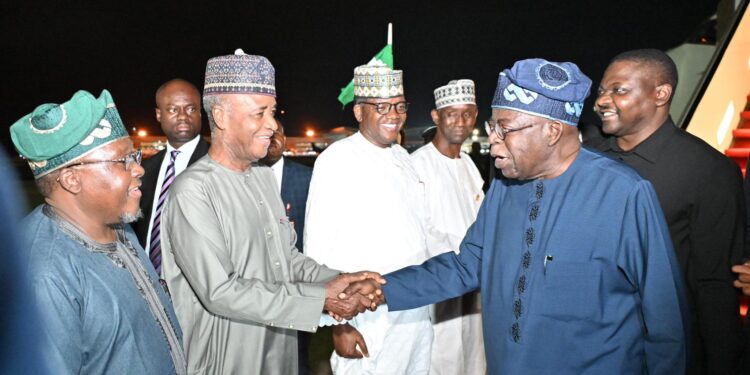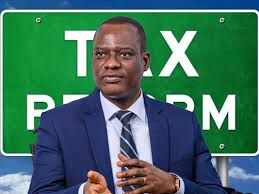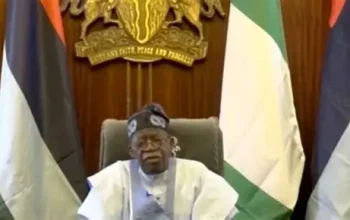President Bola Ahmed Tinubu has returned to Nigeria after a diplomatic tour that took him to Saint Lucia and Brazil. This marks his first participation in the BRICS Summit since Nigeria joined the bloc as a formal partner earlier in 2025.

His arrival at the Presidential Wing of the Nnamdi Azikiwe International Airport in Abuja on Sunday was officially announced by Bayo Onanuga, Special Adviser on Information and Strategy. The president was warmly received by top government officials, including Minister of Budget and Economic Planning Atiku Bagudu, Defence Minister Bello Matawalle, and National Security Adviser Nuhu Ribadu.
Strengthening Nigeria–Caribbean Relations
President Tinubu’s first stop was Saint Lucia, where he undertook a state visit aimed at deepening Nigeria’s relationship with Caribbean countries. According to the presidency, this visit was part of broader efforts to expand diplomatic and economic cooperation with nations in that region.
While in Saint Lucia, Tinubu addressed a special joint session of the country’s parliament. In recognition of his efforts and diplomatic engagement, he was honored with the title Knight Commander of the Order of Saint Lucia (KCOSL)—the highest national award of the island nation. The honor symbolized Saint Lucia’s appreciation of Nigeria’s growing presence and leadership in international affairs.
A New Era for Nigeria at the BRICS Summit
From Saint Lucia, President Tinubu traveled to Rio de Janeiro, Brazil, to attend the 17th BRICS Summit. This summit was particularly significant, as it marked Nigeria’s first official participation since joining the organization in January 2025. Nigeria became part of BRICS alongside other newly admitted partner countries such as Belarus, Bolivia, Cuba, Kazakhstan, Malaysia, Thailand, Uganda, and Uzbekistan.
BRICS, originally made up of Brazil, Russia, India, China, and South Africa, is a coalition of major emerging economies. With its expansion, the bloc now includes countries that represent the Global South—nations that often face challenges in global representation and influence. The partner-country category was introduced during the previous summit held in Kazan, Russia, to allow greater inclusion of developing nations.
Tinubu Calls for Fairness in the Global System
At the summit, President Tinubu delivered a compelling speech that addressed the urgent need to reform the current global structure. He argued that the existing international systems—particularly those relating to finance and governance—often place developing countries at a disadvantage.
Tinubu stated, “The world must rethink how the global order operates. We can no longer ignore the imbalance that exists. Financial institutions and decision-making structures must reflect the realities and aspirations of emerging economies like Nigeria.”
He went on to stress the importance of shared progress and the need for a more equitable system that offers every nation a fair opportunity to grow.
Tackling Climate Injustice
President Tinubu did not shy away from highlighting Africa’s struggle with climate change. Despite being responsible for a very small percentage of global emissions, African nations continue to bear the brunt of environmental degradation, food insecurity, and extreme weather events.
“Africa has contributed the least to global emissions but suffers the most from its consequences,” he noted.
In response, Tinubu reiterated Nigeria’s commitment to climate action and resilience. He referenced major initiatives like the African Carbon Market Initiative and the Great Green Wall—projects designed to reduce carbon emissions, combat desertification, and create sustainable jobs across the continent.
He also voiced his support for global cooperation ahead of the COP-30 climate conference, expressing hope that it will lead to stronger and more inclusive climate strategies.
“We are taking bold steps to promote renewable energy, nature-based solutions, and stronger urban infrastructure,” Tinubu said. “These are not just environmental goals, but developmental necessities.”
Health as a Pillar of Development
Health also featured prominently in the president’s remarks. Tinubu emphasized the growing threat of non-communicable diseases and the urgent need to strengthen healthcare systems across developing nations.
He urged the BRICS bloc to evolve beyond a political and economic alliance into a platform that drives innovation, healthcare, and global solidarity.
“BRICS should not just be a gathering of emerging economies,” he said. “It should be a community built on shared goals—solutions rooted in sustainability, cooperation, and mutual support.”
A Commitment to South–South Cooperation
President Tinubu concluded his address by reaffirming Nigeria’s dedication to South–South collaboration and long-term development goals. He highlighted Vision 2050, Nigeria’s strategic roadmap for national growth, and emphasized the country’s dedication to meeting its climate and development commitments.
“Our vision is clear—we are building a Nigeria that is resilient, inclusive, and prosperous. We believe this can only be achieved through collaboration and a global system that recognizes the value of every nation,” he said.
Also Read:



